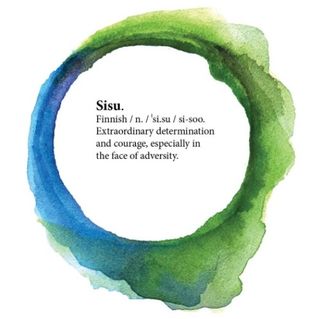Resilience
What Finnish Can Teach Us About Resilience
Discovering the secrets of sisu.
Posted March 7, 2018

Resilience is a hot topic in psychology. Indeed, there is considerable interest in a broad constellation of related qualities, from perseverance to grit. These all pertain in some way to that precious ability to withstand challenges, delineating subtle differences in that respect. Resilience itself is often used to denote the ability to 'bounce back' and recover from adversity, and generally to withstand and adapt to stress. Then, capturing strengths of steadfastness, patience, endurance, and commitment we have the notion of perseverance. And more recently, the concept of grit has come to prominence through the work of Angela Duckworth, who defines this as passion and perseverance for long-term goals.
This kind of lexical richness is invaluable. With any phenomenon, being able to tease it apart and identify subtle nuances greatly assists our understanding of it. But in that respect, our language can pose a problem. Specifically, our understanding is limited to concepts that happen to have been identified in the language(s) we speak. In my case—and, more importantly, in the case of mainstream academic psychology—this generally means English. The issue is this: isn’t it possible that ideas exist in other languages which we don’t have in English? Indeed it is. These are known as ‘untranslatable’ words.
Untranslatable words
I don’t mean literally untranslatable. A sense of their meaning can usually be conveyed in a few sentences. Rather, they are terms that lack an exact equivalent in our own tongue. And they are significant for many reasons. Most intriguingly, they can reveal phenomena which have been overlooked or underappreciated in one’s own culture and language.
For that reason, for the past two years, I have been immersed in a quest to collect such words, specifically ones relating to wellbeing (that being my area of interest as a researcher in positive psychology). This ‘positive lexicography’ currently features nearly 1,000 words, as I explore in two new books (please see bio for details).
All of which brings me to the fascinating notion of sisu, one of the stars of the lexicography.
Stumbling on sisu
In fact, sisu kickstarted my whole lexicographic project. In 2015, when attending an international positive psychology conference, I stumbled across a presentation on sisu by Emilia Lahti, who is striving to bring its virtues to the world’s attention. She described it as a vital Finnish concept which, although related to grit and resilience, is not synonymous, and in fact lacks a precise equivalent in English.
This sense of untranslatability intrigued me. When I returned home to England, I got talking about it with my mum, and it occurred to us that most languages probably have similarly interesting and yet untranslatable words. It furthermore struck me that it would be worth collecting as many of these as possible, focusing specifically on wellbeing. And so the lexicography was born.
But what is sisu? Essentially, it appears to convey a form of extraordinary and courageous inner determination, particularly in the face of extreme adversity and/or challenges which appear to exceed our capacities. This is not synonymous with any of the concepts introduced above. Rather, it brings something new to our understanding of this area of human endeavor. For instance, Lahti’s analyses indicate that it often has implicit moral dimension, involving ‘the courage to take action against very slim odds, to stand up for what is right, and to have integrity and take responsibility for one’s actions.’
Sharing sisu
Sisu is celebrated as a nation-definition resource that has enabled Finland to survive and indeed thrive in the face of adversity. But Lahti’s message is that sisu does not only belong to Finns, even if they had the foresight to create the term. It’s a human quality we may all, ideally, tap into. Indeed, she is helping people do just that. She has founded an initiative called Sisu not Silence, aimed at combating the appalling spectre of interpersonal violence, particularly domestic abuse. Lahti was herself a victim of such mistreatment, an ordeal which she describes as taking her on a long, challenging journey of rebuilding. But for all that the path was painful, she suggests that it was also ultimately empowering, as she came to appreciate her deep reserves of sisu in overcoming her trauma.
Moreover, Lahti resolved to help others in similarly iniquitous situations, hence her initiative. Her efforts include a great feat of physical endurance, running an incredible 50 marathons in 50 days across New Zealand. That in itself is an embodiment of sisu. But she is also hoping to awaken and nurture sisu in others. To that end, along with her expedition, she is convening events where people may be empowered to speak out and tell their own stories, becoming advocates for positive change in their communities.
In this way, people may hopefully discover reserves of strength and determination that they may not have even realized they possessed. And from an academic perspective, sisu adds depth and texture to our understanding of the nexus of strengths represented by terms like grit and resilience, thereby furthering our appreciation of human potential.




